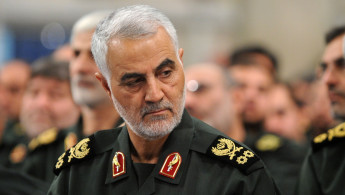Follow us on Facebook, Twitter and Instagram to stay connected
Iranian and Palestinian accused of hacking US websites in revenge for Qasem Soleimani killing
Two men, one thought to be Iranian and the other Palestinian, have been indicted on hacking charges after dozens of US websites were "defaced" in retaliation for the killing of Iranian General Qasem Soleimani in a US airstrike.
Behzad Mohammadzadeh and Marwan Abusrour were charged with conspiracy to commit intentional damage to a protected computer, and intentional damage to a protected computer, according to court documents seen by The New York Times.
It is thought that Mohammadzadeh is a 19-year-old citizen of Iran, and his co-conspirator Abusrour is 25 and identified as a "stateless national of the Palestinian Authority", according to indictment documents.
Some 51 US websites were targeted in the cyberattack.
The defacing included images of General Soleimani and anti-American slogans, along with links to the hackers' Instagram pages.
One federal agency website was hacked following the death of the general, but it is unclear if it was part of the 51 targeted by the duo.
"Hacked by Iran Cyber Security Group Hackers," text on the website read before it was put back online.
"This is only small part of Iran's cyber ability!"
"These hackers are accused of orchestrating a brazen cyber-assault that defaced scores of websites across the country as a way of protesting and retaliating against the United States for killing the leader of a foreign terrorist organization," Joseph R. Bonavolonta, special agent in charge of the FBI's Boston Division, said in a statement.
"Now, they are wanted by the FBI and are no longer free to travel outside Iran or Palestine without risk of arrest."
|
The indictment claims Mohammadzadeh publicly took responsibility for more than 1,000 hacked websites across the world with pro-Iranian messages, and Abusrour publicly claimed to have hacked 300 websites with "pro-Islamic and pro-Palestinian messages".
The latter also allegedly traded in stolen credits cards.
Tehran’s cyberwarfare tactics
Tehran last week hit back at allegations by Microsoft that Iran based hackers had targeted the US presidential campaigns, declaring it does not care about the election's outcome.
Microsoft claimed that it thwarted cyber attacks by hackers from China, Russia and Iran who have been targeting staff from the campaigns of President Donald Trump and his Democratic rival Joe Biden, ahead of the November vote.
Both the Trump and Biden campaigns have been cited by media as saying they were aware of being targeted by hackers.
"The United States, which has for decades been meddling in the elections of other countries such as Iran, is in no place to make such absurd claims," state news agency IRNA quoted Iran's foreign ministry spokesman Saeed Khatibzadeh as saying.
As an instance, he pointed to the role of the US Central Intelligence Agency in a coup in 1953, which toppled former prime minister Mohammad Mosaddegh, who had called for Iran's oil to be nationalised.
It was clear that "foreign activity groups have stepped up their efforts targeting" the 3 November election, Microsoft said on Thursday.
The firm said an Iran-based group called Phosphorus has been targeting personal accounts of people associated with the Trump campaign.
"For Tehran, it does not matter who is in the White House. What matters is Washington's commitment to international rights, rules and norms, not meddling in others' affairs and acting on their commitments," Khatibzadeh said.
Decades-old tensions between Tehran and Washington have escalated since 2018, when Trump unilaterally withdrew the US from a multinational accord that limited Iran's nuclear programme. Trump subsequently reimposed crippling sanctions on Iran's economy.





 Follow the Middle East's top stories in English at The New Arab on Google News
Follow the Middle East's top stories in English at The New Arab on Google News

![MP Essam Diab's pursuit to block TikTok in Egypt has revived an already ongoing debate in the country. [Getty]](/sites/default/files/styles/image_330x185/public/1230748046.jpeg?h=a5f2f23a&itok=-8MqBLLC)
